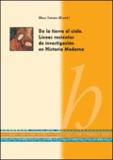Por favor, use este identificador para citar o enlazar a este item:
http://hdl.handle.net/10261/79329COMPARTIR / EXPORTAR:
 SHARE
BASE SHARE
BASE
|
|
| Visualizar otros formatos: MARC | Dublin Core | RDF | ORE | MODS | METS | DIDL | DATACITE | |

| Título: | Os Familiares do Santo Ofício de uma localidades do sul de Portugal (Arraiolos): perfil social e recrutamento |
Autor: | Lopes, Bruno | Palabras clave: | Portugal Idade Moderna Inquisição Familiares do Santo Ofício Elites locais Distinção social Early Modern times Inquisition Social distinction Familiares do Santo Ofício |
Fecha de publicación: | 2013 | Editor: | Institución Fernando el Católico | Citación: | De la tierra al cielo. Líneas recientes de investigacion en historia moderna. Serrano, Eliseo (coord.). 53-83 (2013) | Resumen: | [EN]This study has as purpose the analysis of the social profile of the familiares of the Portuguese
Inquisition (Santo Ofício) that lived in Arraiolos, a town in the vicinity of Évora, in
Alentejo, between 1570 and 1773.
As primary sources for this work were used the habilitações of the inquisition; complemented
by the use of city council documentation. The starting point consists of a prosopographic
exercise.
As the inquisitorial staff became more defined, the Inquisition acquired characteristics
of an entity that promoted social distinction. In Arraiolos, the familiares understood that
early on, which lead to the establishment of strong links between the local (widened) elite
and the agents of the Santo Ofício. These individuals accumulated positions in local institutions
and acted as inquisitorial agents.
Through this study it will be possible to understand how the familiares and the members
of local governance articulated. Where were they recruited? What strategies did they define
to increase and consolidate their positions in society? [PORT]Este estudo pretende analisar o perfil social dos familiares do Santo Ofício que viveram em Arraiolos, uma localidade próxima da cidade de Évora, no Alentejo, entre 1570 e 1773. Como fontes primárias para este trabalho foram utilizadas as habilitações do Santo Ofício; complementaram-se com a utilização de documentação camarária. Partiu-se de um exercício prosopográfico. À medida que os quadros inquisitoriais se foram definindo, a Inquisição ganhou características de entidade promotora da distinção social. Em Arraiolos, os familiares desde cedo se aperceberam desta realidade, resultando numa forte articulação entre a elite local (alargada) e os agentes do Santo Ofício. Estes indivíduos acumulavam postos nas instituições locais e actuavam como agentes inquisitoriais. Através deste estudo será possível compreender como se articulavam os familiares com os membros da governança local. Onde eram recrutados? Que estratégias definiram para aumentar e consolidar as suas posições na sociedade? |
Descripción: | I Encuentro de Jóvenes Investigadores, Zaragoza, 9 y 10 de Febrero del 2012 | Versión del editor: | http://hmoderna.cchs.csic.es/webfehm/ | URI: | http://hdl.handle.net/10261/79329 | DOI: | 10.20350/digitalCSIC/11227 |
| Aparece en las colecciones: | (CCHS-IH) Fundación Española de Historia Moderna |
Ficheros en este ítem:
| Fichero | Descripción | Tamaño | Formato | |
|---|---|---|---|---|
| I Encuentro J.Investigadores_Zaragoza_2013_p.0053-0083_Lopes.pdf | 499,48 kB | Adobe PDF |  Visualizar/Abrir |
CORE Recommender
Page view(s)
262
checked on 19-abr-2024
Download(s)
189
checked on 19-abr-2024
Google ScholarTM
Check
Altmetric
Altmetric
NOTA: Los ítems de Digital.CSIC están protegidos por copyright, con todos los derechos reservados, a menos que se indique lo contrario.
